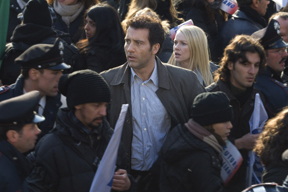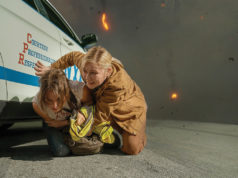It’s easy to read too much into the similarities between a movie and the moment that it comes out. Two markedly different movies out this week – Confessions of a Shopaholic and The International – seem to speak to our current economic climate, yet we know that films are made well ahead of their release date and that filmmakers don’t have the power to predict what state the world will be in by the time their products hit the screen. That doesn’t stop us from looking for meaning, looking for movies that go beyond mere entertainment to address our present situation.
The main character of Confessions of a Shopaholic is in deep financial trouble that serves as a metaphor for our country’s economic crisis. That’s right, her $900 purchase of Marc Jacobs underwear directly correlates to the housing market’s crash. Oh, I’m kidding. There’s no metaphor here, and even if there were, I’m not savvy enough about fashion or finance to tease it out.
 The movie’s protagonist probably could. She is Rebecca Bloomwood (Isla Fisher), a recently unemployed New York journalist who unexpectedly wins herself a new job at a struggling financial magazine called Successful Saving by pitching the mag’s young editor, Luke (Hugh Dancy), a story idea comparing different types of investment portfolios to women’s shoes. Luke hires her for her unorthodox thinking, and her breezy articles soon make her a star writer. The XXL-sized irony is that while Rebecca is advising readers on how to save money, she herself is thousands of dollars in debt because she can’t stop buying new clothes.
The movie’s protagonist probably could. She is Rebecca Bloomwood (Isla Fisher), a recently unemployed New York journalist who unexpectedly wins herself a new job at a struggling financial magazine called Successful Saving by pitching the mag’s young editor, Luke (Hugh Dancy), a story idea comparing different types of investment portfolios to women’s shoes. Luke hires her for her unorthodox thinking, and her breezy articles soon make her a star writer. The XXL-sized irony is that while Rebecca is advising readers on how to save money, she herself is thousands of dollars in debt because she can’t stop buying new clothes.
The film is a loose, Americanized adaptation of the first two novels in Sophie Kinsella’s London-based Shopaholic series, and the word “shopaholic” isn’t too strong a word to describe Rebecca, who exhibits many of an addict’s personality traits. She has a teensy problem with perspective, evidenced by her line early on: “No man will ever love you or treat you as well as a store.” She hides her overdue bills, entertains irrational fantasies of winning the lottery, gets into a physical altercation with another woman over a pair of Gucci boots, and lies compulsively not only to the debt collector who’s stalking her (Robert Stanton) but also to Luke, her parents, her co-workers, and her best friend, Suze (Krysten Ritter).
These are not attractive qualities, yet with both the book and the movie, I can’t shake the feeling that we’re meant to find these to be adorable eccentricities instead of the signs of severe emotional problems. The film does have Rebecca confronted with her own deceit in a humiliating encounter on a TV show. Nice try, but the scene rings hollow, as do Rebecca’s subsequent attempts to make amends. There’s something rancid, too, about the subplot in which Rebecca goes to a support group for compulsive shoppers and winds up dragging the other members of the group back into their old habits. While this movie is supposed to be a plush fantasy of a world where you can always buy the latest high-end fashions before anyone else, it’s also supposed to be an addiction drama on some level, and it never conveys its intended message of living and dressing within one’s means with any conviction.
That’s strange because director P.J. Hogan juggled romantic farce with deeper moral considerations so beautifully in his 1997 hit My Best Friend’s Wedding. (Since then, he’s only done an undeservedly obscure adaptation of Peter Pan and a much more deservedly obscure drama called Unconditional Love.) His best work shows inimitable flair for physical comedy and throwaway comedy bits, and some of that comes through here in Rebecca being totally obscured by the train of Suze’s wedding dress when the two of them sit on a sofa, or Rebecca’s mom (Joan Cusack) trying to serve cake to the French media mogul (Kristin Scott Thomas) who owns Successful Saving. Too many of the other bits feel strained and out of place, however.
Isla Fisher deserved better in her first lead role. The tiny Australian actress made a huge splash three years ago as the psycho hot chick in Wedding Crashers but hasn’t had many parts since then that let her show her gifts as a clown. The single funniest bit here is when Rebecca tries salsa dancing with Luke. Fisher turns this into a spasmodic ballet of flying elbows and knees, blissfully unaware of how ridiculous she looks. For a character who’s self-conscious and overly put together, this moment of spontaneity is thoroughly winning. Too bad it cuts so glaringly against the grain of a movie that tries to make a heroine out of an incorrigible spendthrift.
The villain in The International is a Luxembourg-based bank that’s meddling in the Third World’s small-arms trade so that it can assume control of the debt generated by civil wars and coups, thus gaining invaluable economic leverage over the governments of these countries. This is explained to Interpol agent Louis Salinger (Clive Owen) and Manhattan prosecutor Eleanor Whitman (Naomi Watts) by a prominent Italian politician (Luca Giorgio Barbareschi) shortly before the politician is assassinated at a rally in Rome. Our heroes run all over Europe and New York City trying to get the goods on the bank’s higher-ups, but their leads and investigators keep turning up dead.
It’s a good time for a movie where the bad guys are bankers, but this movie gets it wrong. We don’t hate bankers because they put contracts out on people. We hate them because they make bad loans and invest in incomprehensible stock derivatives and use federal bailout money to award huge bonuses to their bumbling executives while homeowners are losing their shirts. Where other recent socially conscious conspiracy thrillers like The Constant Gardener and Syriana managed to educate us about social issues within the genre’s framework, this film fails to enlighten us much about the workings of high finance.
Fortunately, it has other qualities. This is the first foray into Hollywood genre entertainment by German director Tom Tykwer, and he takes to it pretty well. If you’ve seen other Tykwer films like Run Lola Run or Perfume: The Story of a Murderer, you know that regardless of anything else, his movies are going to look good. Cinematographer Frank Griebe lays an attractive glaze of light over the picture while bringing out the individual character of the movie’s various locations (including Berlin, Lyon, and Istanbul). We’ve seen lots of thrillers that take place in a glass-and-steel corporate-tower environment, but Griebe makes the buildings look newly cold and menacing as they dwarf the human scale.
More importantly, Tykwer employs his usual calm and deliberate pace to gradually turn the screws of suspense. He gets us wound up enough that something as innocuous as a pedestrian brushing past Salinger in the street seems like a harbinger of doom. He breaks the tension with action set pieces, most notably a highly entertaining shootout on the spiraling walkways of New York’s Guggenheim Museum. The realist in me carps that it’s unlikely the bank would be so ham-handed as to have a cultural landmark stormed by a bunch of guys with Uzis. The action fan in me notes the director’s creative use of the venue’s nooks and crannies, and the spectacular backdrop that the museum (actually, it’s mostly an exact replica made in a Berlin airplane hangar) provides for the shoot-up.
More firefighting comes from Owen and Watts, who turn out to make an inspired pairing. Owen brings a seething anger to this part that makes the character feel less like a cliché of a burned-out, lone-wolf investigator. Both of these actors tend to meet tough co-stars with toughness of their own, and Watts rises to her leading man’s level, biting off her line deliveries as Whitman gives Salinger crap about taking the case too personally and not getting enough sleep. These dissimilar-looking performers give the impression of kindred spirits, and it’s not often that you see the leads in an action movie fall into this kind of sync.
They give a human face to this flawed but eminently watchable thriller, which manages to fulfill our genre expectations (i.e. the bad guys get theirs) while still conveying a sense of helplessness at the way banks seem unaccountable to anyone while holding governments and businesses by the short and curlies. In that way, The International feels very much a part of our financially troubled moment.











